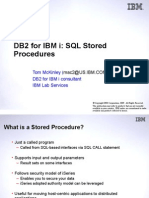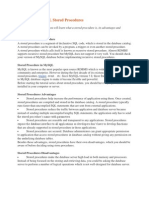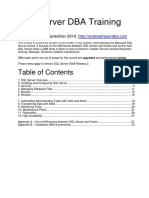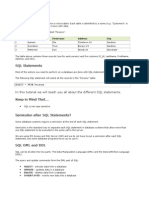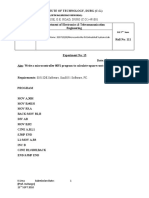SQL Server Stored Procedures
Uploaded by
hkdashinSQL Server Stored Procedures
Uploaded by
hkdashinSQL Server Stored procedures
Overview A stored procedure is nothing more than prepared SQL code that you save so you can reuse the code over and over again. So if you think about a query that you write over and over again, instead of having to write that query each time you would save it as a stored procedure and then just call the stored procedure to execute the SQL code that you saved as part of the stored procedure.
In addition to running the same SQL code over and over again you also have the ability to pass parameters to the stored procedure, so depending on what the need is the stored procedure can act accordingly based on the parameter values that were passed.
Take a look through each of these topics to learn how to get started with stored procedure development for SQL Server.
You can either use the outline on the left or click on the arrows to the right or below to scroll through each of these topics.
Different options for creating SQL Server stored procedures
Overview There are various options that can be used to create stored procedures. In these next few topics we will discuss creating a simple stored procedure to more advanced options that can be used when creating stored procedures.
Explanation Some of the topics we will cover include: Creating a simple stored procedure Using input parameters Using output parameters Using Try Catch
Creating a simple stored procedure
(CREATE PROCEDURE) Overview As mentioned in the tutorial overview a stored procedure is nothing more than stored SQL code that you would like to use over and over again. In this example we will look at creating a simple stored procedure. Explanation Before you create a stored procedure you need to know what your end result is, whether you are selecting data, inserting data, etc.. In this simple example we will just select all data from the Person.Address table that is stored in the AdventureWorks database. So the simple T-SQL code would be as follows which will return all rows from this table. SELECT * FROM AdventureWorks.Person.Address
To create a stored procedure to do this the code would look like this: CREATE PROCEDURE uspGetAddress AS SELECT * FROM AdventureWorks.Person.Address GO
To call the procedure to return the contents from the table specified, the code would be: EXEC uspGetAddress --or just simply uspGetAddress
When creating a stored procedure you can either use CREATE PROCEDURE or CREATE PROC. After the stored procedure name you need to use the keyword "AS" and then the rest is just the regular SQL code that you would normally execute.
On thing to note is that you cannot use the keyword "GO" in the stored procedure. Once the SQL Server compiler sees "GO" it assumes it is the end of the batch.
Also, you cannot change database context within the stored procedure such as using "USE dbName" the reason for this is because this would be a separate batch and a stored procedure is a collection of only one batch of statements.
How to create a SQL Server stored procedure with parameters
Overview The real power of stored procedures is the ability to pass parameters and have the stored procedure handle the differing requests that are made. In this topic we will look at passing parameter values to a stored procedure.
Explanation Just like you have the ability to use parameters with your SQL code you can also setup your stored procedures to except one or more parameter values.
One Parameter
In this example we will query the Person.Address table from the AdventureWorks database, but instead of getting back all records we will limit it to just a particular city. This example assumes there will be an exact match on the City value that is passed. CREATE PROCEDURE uspGetAddress @City nvarchar(30) AS SELECT * FROM AdventureWorks.Person.Address WHERE City = @City GO
To call this stored procedure we would execute it as follows: EXEC uspGetAddress @City = 'New York'
We can also do the same thing, but allow the users to give us a starting point to search the data. Here we can change the "=" to a LIKE and use the "%" wildcard. CREATE PROCEDURE uspGetAddress @City nvarchar(30) AS SELECT * FROM AdventureWorks.Person.Address WHERE City LIKE @City + '%' GO
In both of the proceeding examples it assumes that a parameter value will always be passed. If you try to execute the procedure without passing a parameter value you will get an error message such as the following:
Msg 201, Level 16, State 4, Procedure uspGetAddress, Line 0
Procedure or function 'uspGetAddress' expects parameter '@City', which was not supplied.
Default Parameter Values
In most cases it is always a good practice to pass in all parameter values, but sometimes it is not possible. So in this example we use the NULL option to allow you to not pass in a parameter value. If we create and run this stored procedure as is it will not return any data, because it is looking for any City values that equal NULL. CREATE PROCEDURE uspGetAddress @City nvarchar(30) = NULL AS SELECT * FROM AdventureWorks.Person.Address WHERE City = @City GO
We could change this stored procedure and use the ISNULL function to get around this. So if a value is passed it will use the value to narrow the result set and if a value is not passed it will return all records. (Note: if the City column has NULL values this will not include these values. You will have to add additional logic for City IS NULL) CREATE PROCEDURE uspGetAddress @City nvarchar(30) = NULL AS SELECT * FROM AdventureWorks.Person.Address WHERE City = ISNULL(@City,City) GO
Multiple Parameters
Setting up multiple parameters is very easy to do. You just need to list each parameter and the data type separated by a comma as shown below. CREATE PROCEDURE uspGetAddress @City nvarchar(30) = NULL, @AddressLine1 nvarchar(60) = NULL AS SELECT * FROM AdventureWorks.Person.Address WHERE City = ISNULL(@City,City) AND AddressLine1 LIKE '%' + ISNULL(@AddressLine1 ,AddressLine1) + '%' GO
To execute this you could do any of the following: EXEC uspGetAddress @City = 'Calgary' --or EXEC uspGetAddress @City = 'Calgary', @AddressLine1 = 'A' --or EXEC uspGetAddress @AddressLine1 = 'Acardia' -- etc...
Returning stored procedure parameter values to a calling stored procedure (OUTPUT)
Overview In a previous topic we discussed how to pass parameters into a stored procedure, but another option is to pass parameter values back out from a stored procedure. One option for this may be that you call another stored procedure that does not return any data, but returns parameter values to be used by the calling stored procedure. Explanation Setting up output paramters for a stored procedure is basically the same as setting up input parameters, the only difference is that you use the OUTPUT clause after the parameter name to specify that it should return a value. The output clause can be specified by either using the keyword "OUTPUT" or just "OUT". Simple Output CREATE PROCEDURE uspGetAddressCount @City nvarchar(30), @AddressCount int OUTPUT AS SELECT @AddressCount = count(*) FROM AdventureWorks.Person.Address WHERE City = @City
Or it can be done this way: CREATE PROCEDURE uspGetAddressCount @City nvarchar(30), @AddressCount int OUT AS SELECT @AddressCount = count(*) FROM AdventureWorks.Person.Address WHERE City = @City
To call this stored procedure we would execute it as follows. First we are going to declare a variable, execute the stored procedure and then select the returned valued. DECLARE @AddressCount int EXEC uspGetAddressCount @City = 'Calgary', @AddressCount = @AddressCount OUTPUT SELECT @AddressCount
This can also be done as follows, where the stored procedure parameter names are not passed. DECLARE @AddressCount int EXEC uspGetAddressCount 'Calgary', @AddressCount OUTPUT SELECT @AddressCount
You might also like
- Administering MS SQL Server 2019 DatabasesNo ratings yetAdministering MS SQL Server 2019 Databases6 pages
- Different Stored Procedures in SQL ServerNo ratings yetDifferent Stored Procedures in SQL Server1,978 pages
- Writing A Stored Procedure: Nathan PondNo ratings yetWriting A Stored Procedure: Nathan Pond11 pages
- SQL Server Profiler: Step by Step GuideNo ratings yetSQL Server Profiler: Step by Step Guide11 pages
- SQL Server Management Studio - Tips For Improving The TSQL Coding Process - Stack Overflow PDFNo ratings yetSQL Server Management Studio - Tips For Improving The TSQL Coding Process - Stack Overflow PDF9 pages
- Writing Stored Procedures For Microsoft SQL Server100% (4)Writing Stored Procedures For Microsoft SQL Server334 pages
- SQL Server Maintenance Plans Brad EbookNo ratings yetSQL Server Maintenance Plans Brad Ebook270 pages
- Implementing A Database Design Using Microsoft SQL ServerNo ratings yetImplementing A Database Design Using Microsoft SQL Server90 pages
- MySQL Tutorial - MySQL by Examples For Beginners PDFNo ratings yetMySQL Tutorial - MySQL by Examples For Beginners PDF36 pages
- Client Server Model: Many Databases Applications Are Built inNo ratings yetClient Server Model: Many Databases Applications Are Built in52 pages
- Learn SQL Server Administration in A Month of LunchesNo ratings yetLearn SQL Server Administration in A Month of Lunches1 page
- DB2 9.7 for Linux, UNIX, and Windows Database Administration: Certification Study NotesFrom EverandDB2 9.7 for Linux, UNIX, and Windows Database Administration: Certification Study Notes5/5 (1)
- How To Create A SQL Server Stored Procedure With ParametersNo ratings yetHow To Create A SQL Server Stored Procedure With Parameters4 pages
- CSE1012Y Database Systems Labsheet 13 - Stored Procedures: Create A Stored ProcedureNo ratings yetCSE1012Y Database Systems Labsheet 13 - Stored Procedures: Create A Stored Procedure12 pages
- Three Components For Knowledge ManagementNo ratings yetThree Components For Knowledge Management15 pages
- How Can Training and People Development Will Enhance KMNo ratings yetHow Can Training and People Development Will Enhance KM7 pages
- WBL Toolkit GapAnalysisofWorkplaceNeeds PDFNo ratings yetWBL Toolkit GapAnalysisofWorkplaceNeeds PDF2 pages
- Call Center Scorecards April 2010: The Balanced ScorecardNo ratings yetCall Center Scorecards April 2010: The Balanced Scorecard4 pages
- Increasing Call Center Effectiveness With First Call ResolutionNo ratings yetIncreasing Call Center Effectiveness With First Call Resolution30 pages
- Spectrum Corporation June 2011 Managing Your Call Center Reporting SolutionNo ratings yetSpectrum Corporation June 2011 Managing Your Call Center Reporting Solution2 pages
- Customer Experience Makeover A Practical Approach To Competitively Differentiated ServiceNo ratings yetCustomer Experience Makeover A Practical Approach To Competitively Differentiated Service10 pages
- Increasing Call Center Effectiveness With First Call ResolutionNo ratings yetIncreasing Call Center Effectiveness With First Call Resolution30 pages
- BHILAI HOUSE, G.E. ROAD, DURG (C.G.) - 491001: Sub Code & Name:328713 (28) Microcontroller & Embedded Systems LabNo ratings yetBHILAI HOUSE, G.E. ROAD, DURG (C.G.) - 491001: Sub Code & Name:328713 (28) Microcontroller & Embedded Systems Lab3 pages
- 5 SKILLS THAT CAN HELP YOU SUCCEED IN THE FIELD OF HEALTH INFORMATICSssssNo ratings yet5 SKILLS THAT CAN HELP YOU SUCCEED IN THE FIELD OF HEALTH INFORMATICSssss4 pages
- Robustfill: Neural Program Learning Under Noisy I/O: Gettoken (Alpha, - 1) - ,' - ' - Tocase (Proper, Gettoken (Alpha, 1) )No ratings yetRobustfill: Neural Program Learning Under Noisy I/O: Gettoken (Alpha, - 1) - ,' - ' - Tocase (Proper, Gettoken (Alpha, 1) )18 pages
- Code - Aster: Operator CALC - INTE - SPECNo ratings yetCode - Aster: Operator CALC - INTE - SPEC6 pages
- Lab - 04 - Handout - Behavioral ModelingNo ratings yetLab - 04 - Handout - Behavioral Modeling12 pages
- Get (Ebook) Core Web Programming, Volumes I & II Includes index by Hall, Marty;Brown, Larry ISBN 9780130897930, 9781681691701, 9781941961995, 0130897930, 1681691701, 1941961991 free all chapters100% (2)Get (Ebook) Core Web Programming, Volumes I & II Includes index by Hall, Marty;Brown, Larry ISBN 9780130897930, 9781681691701, 9781941961995, 0130897930, 1681691701, 1941961991 free all chapters77 pages


